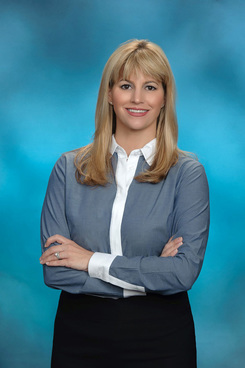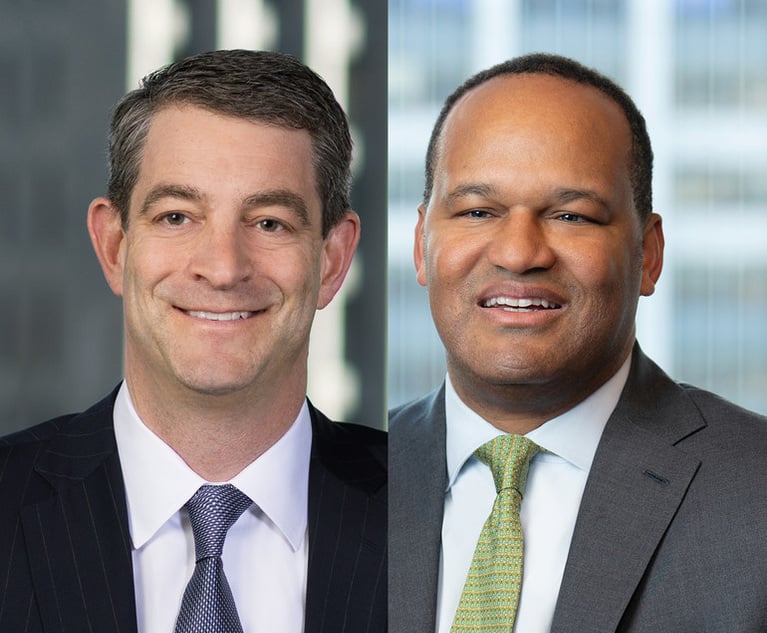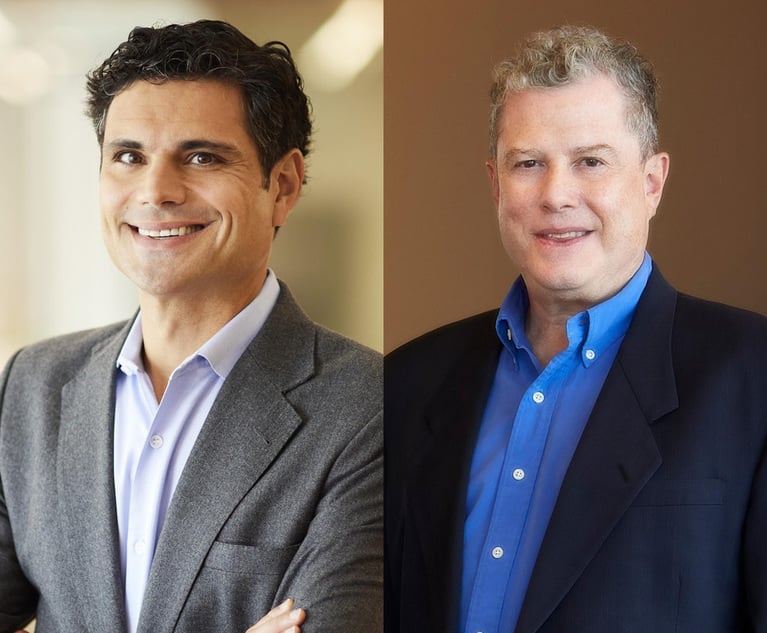Stoel Rives' Melissa Jones on the Generation Gap in Law Firms, Diversity and the Pacific Northwest
"Clients are really interested in making sure that firms are committed to diversity and inclusion. More and more we're seeing clients not just say that—they want numbers and metrics to back it up," Jones says.
April 23, 2020 at 12:38 PM
9 minute read
 Melissa Jones of Stoel Rives.
Melissa Jones of Stoel Rives.
Editor's note: This interview was conducted prior to the COVID-19 pandemic.
After being elected to take over as Stoel Rives' managing partner last May, Melissa Jones assumed the position at the beginning of this year. From her seat in Sacramento, California, the trial lawyer now guides a firm that started in Portland, Oregon, but has since expanded its footprint and grown beyond $200 million in annual revenue. In this interview, she speaks about outside interest in the Pacific Northwest, the generation gap in law firms and her firm's commitment to diversity.
Ben Seal: Your firm might not be quite as well known as some of your competitors in the Am Law 200. To those who aren't familiar with Stoel Rives, how would you describe the firm and its place in the legal market?
Melissa Jones: We are a midsize firm. We consider ourselves a leading corporate and litigation law firm and have full service in a number of our offices. We're focused on supporting industries including energy, natural resources, agribusiness, food and beverage, life sciences and technology, among others. We have about 375 attorneys in 10 offices in seven states and the District of Columbia, and we provide services in regulatory and compliance, business, labor and employment, IP, land use and real estate development and construction law.
BS: What are the biggest opportunities and threats for the firm in the coming year?
MJ: We are very competitive for work because we have extremely talented lawyers and we offer really high-quality service, but because we're in some smaller markets we're more competitive with our rates than Am Law 50 firms. We're competing and doing work at a top-tier level in all our markets, while offering our clients value.
Like all firms, we're watching the economic environment and there are a lot of uncertainties. It looks like it's going to be a great year, and we've had a couple of strong years, but there are a lot of external factors that could impact the business community, so we're keeping an eye on that.
BS: Who do you view as your biggest competition?
MJ: We have market competitors, but the nature of the practice of law is changing and there are a lot more companies taking work in-house. That's impacting firms in the Am Law 200 like Stoel Rives. And we're mindful of the alternative legal service providers as well. Unlike maybe 20 years ago, when firms were just competing with other firms, there are different types of competitors out there we have to be aware of, which is why it's really important for us to remain focused on client service.
BS: You're on the younger side among Am Law 200 firm leaders. What is the most significant benefit that gives you as managing partner?
MJ: I've practiced for over 20 years, so I have the depth of experience of practicing for a long time. With the changes that are potentially going to impact the legal industry in the next 10 years, it can be helpful to have somebody who can work on bridging the gap between generations. At our firm we've had a number of retirements. We've weathered that really well, and we now have a lot of younger partners who've stepped in to be leaders and are doing a fabulous job.
BS: Do you anticipate that it might present any challenges?
MJ: I always think more experience is a good thing, so I'm going into this knowing that I don't have as much experience as some other leaders who have been practicing for 30 to 40 years, and I just try to keep that in mind. My leadership style is to really draw on the experience and knowledge of the partnership as a whole. We have a depth of talent and knowledge, and we're making sure we're tapping into that.
BS: What's the most important lesson you've learned in your first months as managing partner?
MJ: It's a really challenging role. I was expecting that, but I really realized it on Jan. 2 when I started getting a lot of requests. Trying to keep an open mind and listen is something that I think is going to be important to having a successful term.
BS: How do you think being based in the Pacific Northwest has shaped Stoel Rives?
MJ: I think it does shape our culture. We have offices outside the region, including Minneapolis and D.C., but having a large base in the Pacific Northwest has helped form the culture of the firm, which is not just focused on high-quality client service but also a collaborative approach to business development.
BS: What do you make of the outside interest in Portland, Seattle and the rest of the Northwest? Has your firm had to adapt to the increased attention in recent years?
MJ: We're always paying attention to outside factors or firms that are looking at our regions and looking for ways to remain competitive, but I think we do offer a unique combination of qualities for somebody who's practicing law. It's a really great place to have a practice, so that's helped us stay competitive and helped us with recruiting and retaining talent.
BS: Just over a year ago Stoel Rives made a big splash by bringing on a 13-lawyer real estate group in Seattle. What kind of returns have you seen from that team and the expansion of the Seattle office?
MJ: Ultimately we ended up with 18 lawyers [in that move]. That was a group we'd been interested in for a really long time because they had the leading real estate development practice in Seattle and would be a great fit for us culturally. It was really a perfect add for us. In terms of our market position in Seattle, I think it's positioned us very well because they are such a well known and highly regarded group. It's helping us get more known in the market than we even had been before.
An acquisition of a large group is always going to present some challenges, and this has been as smooth as I could imagine of a transition and fit. We think the market in Seattle has a lot of potential, so in terms of growth, we'd be very interested in continuing to expand in Seattle.
BS: Does the firm have its eyes on expanding into any new regions in the next few years?
MJ: We're always looking at that. We don't have any specific regions we're targeting at this point but there are areas that could be a good fit for us and, more importantly, our clients. We're always considering that.
BS: Have you considered mergers in either direction?
MJ: We get approached a fair amount and our executive committee evaluates those opportunities, but our focus on growth has been practices related to our strength in energy and natural resources, and practices that support those industries. We want to add lawyers who are going to fit well with our firm culture and our approach to client service.
BS: How do you approach talent management, and what changes have you made to respond to the industry's growing attention on that area?
MJ: We're one of the five firms that committed to the Move the Needle Fund with Diversity Lab. Our goal with that program is to improve the retention rate of our diverse attorneys so it's at least equal to our retention rate for nondiverse attorneys. This is a five-year process, so we're just getting started working toward our goal, but as we learn what more we can be doing to retain lawyers, I think it'll help us across the board with our entire pool of attorneys.
We have recently adopted core competencies for the professional development of our associates, and related to that we are working on internal processes to help develop associates so they're gaining the skills and access to the opportunities they need.
We've signed on to the ABA wellness pledge, and we are working to ensure we have resources for staff and attorneys to promote wellness. This is a very demanding career and profession, and getting support and access to those resources is important.
BS: What is the most innovative thing your firm has done recently?
MJ: We've been really focused on working on our pricing proposals. We have a CFO who's exceptional at that, and she has a team that works under her. We've developed tools to better assess pricing for our clients so we can offer, when they're interested, alternative fee arrangements, including flat fees and other pricing models, since we know there are clients that want to move away from the billable hour. The vast majority of our work is still billable because clients want it, but we've developed tools to ensure that our pricing is efficient and accurate for clients. And we've adopted a number of document automation programs that we're utilizing to help us add value for clients.
BS: What are clients asking for that feels new or different?
MJ: Clients are really interested in making sure that firms are committed to diversity and inclusion. More and more we're seeing clients not just say that—they want numbers and metrics to back it up and to understand that the firms they're working with are providing them diverse teams. And we know that if you have a diverse team you're going to be giving clients better service.
We've also developed special tools to track billing and matters. A lot of clients have different processes that they're implementing, so we've had to develop our own internal ways of managing hundreds of requests.
BS: What keeps you up at night?
MJ: As a new leader, making sure I'm thinking of everything that I need to be doing. You're pulled in a lot of directions, and what keeps me up at night is ensuring that I am focused on the right tasks and that I am giving them the right amount of attention.
This content has been archived. It is available through our partners, LexisNexis® and Bloomberg Law.
To view this content, please continue to their sites.
Not a Lexis Subscriber?
Subscribe Now
Not a Bloomberg Law Subscriber?
Subscribe Now
NOT FOR REPRINT
© 2025 ALM Global, LLC, All Rights Reserved. Request academic re-use from www.copyright.com. All other uses, submit a request to [email protected]. For more information visit Asset & Logo Licensing.
You Might Like
View All
'None of Us Like It': How Expedited Summer Associate Recruiting Affects Law Students and the Firms Hiring Them

Latham's Lateral Hiring Picks Up Steam, With Firm Adding Simpson Practice Head, Private Equity GC
3 minute read

Leaning Into ‘Core’ Strengths, Jenner’s Revenue Climbs 17%, Profits Soar 23%
4 minute readLaw Firms Mentioned
Trending Stories
Who Got The Work
J. Brugh Lower of Gibbons has entered an appearance for industrial equipment supplier Devco Corporation in a pending trademark infringement lawsuit. The suit, accusing the defendant of selling knock-off Graco products, was filed Dec. 18 in New Jersey District Court by Rivkin Radler on behalf of Graco Inc. and Graco Minnesota. The case, assigned to U.S. District Judge Zahid N. Quraishi, is 3:24-cv-11294, Graco Inc. et al v. Devco Corporation.
Who Got The Work
Rebecca Maller-Stein and Kent A. Yalowitz of Arnold & Porter Kaye Scholer have entered their appearances for Hanaco Venture Capital and its executives, Lior Prosor and David Frankel, in a pending securities lawsuit. The action, filed on Dec. 24 in New York Southern District Court by Zell, Aron & Co. on behalf of Goldeneye Advisors, accuses the defendants of negligently and fraudulently managing the plaintiff's $1 million investment. The case, assigned to U.S. District Judge Vernon S. Broderick, is 1:24-cv-09918, Goldeneye Advisors, LLC v. Hanaco Venture Capital, Ltd. et al.
Who Got The Work
Attorneys from A&O Shearman has stepped in as defense counsel for Toronto-Dominion Bank and other defendants in a pending securities class action. The suit, filed Dec. 11 in New York Southern District Court by Bleichmar Fonti & Auld, accuses the defendants of concealing the bank's 'pervasive' deficiencies in regards to its compliance with the Bank Secrecy Act and the quality of its anti-money laundering controls. The case, assigned to U.S. District Judge Arun Subramanian, is 1:24-cv-09445, Gonzalez v. The Toronto-Dominion Bank et al.
Who Got The Work
Crown Castle International, a Pennsylvania company providing shared communications infrastructure, has turned to Luke D. Wolf of Gordon Rees Scully Mansukhani to fend off a pending breach-of-contract lawsuit. The court action, filed Nov. 25 in Michigan Eastern District Court by Hooper Hathaway PC on behalf of The Town Residences LLC, accuses Crown Castle of failing to transfer approximately $30,000 in utility payments from T-Mobile in breach of a roof-top lease and assignment agreement. The case, assigned to U.S. District Judge Susan K. Declercq, is 2:24-cv-13131, The Town Residences LLC v. T-Mobile US, Inc. et al.
Who Got The Work
Wilfred P. Coronato and Daniel M. Schwartz of McCarter & English have stepped in as defense counsel to Electrolux Home Products Inc. in a pending product liability lawsuit. The court action, filed Nov. 26 in New York Eastern District Court by Poulos Lopiccolo PC and Nagel Rice LLP on behalf of David Stern, alleges that the defendant's refrigerators’ drawers and shelving repeatedly break and fall apart within months after purchase. The case, assigned to U.S. District Judge Joan M. Azrack, is 2:24-cv-08204, Stern v. Electrolux Home Products, Inc.
Featured Firms
Law Offices of Gary Martin Hays & Associates, P.C.
(470) 294-1674
Law Offices of Mark E. Salomone
(857) 444-6468
Smith & Hassler
(713) 739-1250










